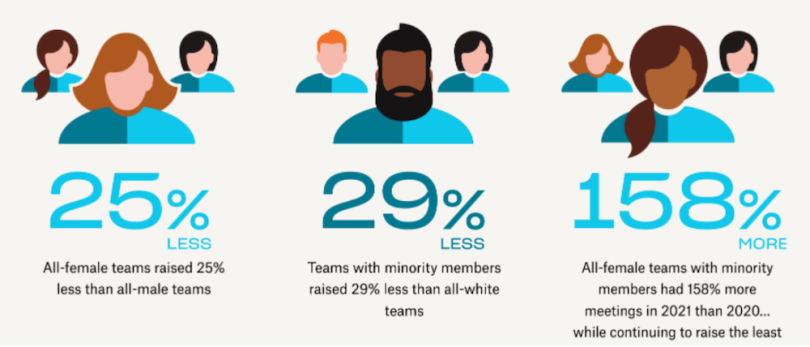Many underrepresented founders have come to expect little more than lip service from the VC industry despite the broad commitment to diversify investment in Black, brown, and women founders in a post-George Floyd era.
The record startup fundraising and investment climate of 2021 have slowed considerably as public market valuations for late-stage tech companies have declined drastically. Likewise, concerns over rising interest rates have added to VCs’ hesitation for making new investments as each week brings more news of mass layoffs from Silicon Valley’s leading companies.
Black entrepreneurs in particular have been hit hard by this pullback from investors. New data shows that Black-founded startups in the U.S. had only raised $324 million by mid-June of 2022. This is a massive reduction compared to the $850 million to $1.2 billion range per quarter across the last five quarters, according to Crunchbase. As a minority founder and investor myself, seeing the continued disparity in investment opportunities for underrepresented founders is disheartening.
Founders are often left in the dark regarding the “game” of fundraising. We send out our pitch decks in the hopes of getting clear and concise feedback from VCs on where our business ideas make sense and where they need to be improved. In reality, though, that feedback can often feel disjointed or confusing. In order to successfully raise money as a minority founder, you need to use tools and information that offer insight into the process. This transparency allows minority founders to understand the nature of what they’re up against, find networks dedicated to overcoming these challenges, and ultimately reach their fundraising goals.
Transparency, or the ability to clearly see the details that impact my success during my fundraising journey, has been essential in learning the ins and outs of this process. It enabled me to get the feedback I needed to improve the way I was communicating the strengths of my business to investors through data.
Let’s take a closer look at how you can achieve just that.
Disparities in VC Fundraising
- All-female teams raised 25% less than all-male teams.
- Teams with minority members raised 29% less than all-white teams.
- All-women teams with minority members had 158 percent more meetings in 2021 than 2020 but still continue to raise less capital compared to other groups.
A Closer Look at Bias in Fundraising
Data proves that early stage founders face the most scrutiny, largely due to the fact their experience and ideas have yet to be proven. Additionally, when it comes to minority founders, I suspect many VCs don’t always make investment decisions based on data points that indicate the best business opportunities. One area I've seen this is VCs evaluation of the team slide. Investors receive hundreds of pitch decks, and the average VC tends to focus on the team slide to get a sense of whom they might be investing in. However, there are discrepancies in viewing times for minority founders that correlate with less funding, which suggests to me that investors may have a harder time believing the information they are getting from underrepresented founders.
Underrepresented founders often must also take more meetings than their counterparts to raise their round, according to DocSend’s recent Funding Divide report. For example, all-women teams with minority members had 158 percent more meetings in 2021 than 2020 but still continue to raise less capital compared to other groups.

As a founder, you can’t do much to change what investors focus on when they view your pitch deck, but knowing this information can help you elevate certain sections of the deck to get their attention. Today’s investors want to see clear plans toward monetization, and that your ideas resonate within their given marketplace. Focus on making the business plan and traction sections strong.
Connect to a Network That Believes In You
Underrepresented founders must understand investor trends and shifting expectations in order to deliver an effective message that highlights the great investment opportunity they’re presenting. One of the best ways to stay on top of these trends is through engaging with other founders that have recently fundraised to get an understanding of what’s working and what’s not.
Connecting this way can be tough because where you come from dictates who you know. This limits access to individuals who could provide fundraising insights for you. Your network is the foundation of your support system when it comes to fundraising, so it's important to begin establishing these relationships long before you begin your fundraising journey. You can begin to build trust within your network, which is essential in the absence of demonstrated traction for your business.
Let’s talk about what that network can look like and how it can help you navigate through unique challenges while fundraising.
According to a recent diversity report from Transparent Collective, key challenges for underfunded founders include a lack of access to networking opportunities and spaces, reliance on crowdfunding and a lack of high-net-worth friends and family for funding support. The throughline here is all these problems stem from who they know.
Fortunately, these challenges have sparked action from select groups of investors who have committed to establishing funds and accelerators focused on helping minority founders succeed. The value of these programs is in enabling collaboration between exceptional venture-backed startups and unlocking learning opportunities across a network of peers facing similar challenges, and of course access to capital.
Visible Hands, a pre-seed fund that supports underrepresented founders building tech startups, launched its second accelerator cohort to support 51 underrepresented founders in September of this year. In addition to going through the 14-week program, founders receive an initial $25,000 investment and have an opportunity to earn additional investments from the VC firm, as well as connect with peers to share learnings and strategy throughout the program.
Beyond committing time and money to helping the next generation of underrepresented founders succeed, we should take the time to understand that it’s not just the founders who benefit from these efforts. Diversity and inclusion aren’t just buzz words, they are ingredients that help to build more thoughtful, efficient and profitable business solutions to an ever-changing landscape.
Inclusion Improves Innovation
Because underrepresented founders come from different backgrounds, they bring diverse experiences and perspectives that enable them to bring new solutions to the world, offering new ideas that can uniquely address sizable and emerging markets. I have seen how startup fundraising works from both sides, and the only way to achieve meaningful progress and give these founders a better shot at success is for investors to offer more than lip service to diversity and commit significant capital to these founders that will move the needle on the funding gap.
There is no one-size-fits-all solution to the funding divide, and simply talking about the need for change isn’t enough. As founders, it’s our responsibility to work together and use the resources available to us that can help increase our likelihood of success. Our success is the only thing that will prove to investors and their LPs that diverse founders outperform. We must succeed — the impact our unique ideas bring to the world is too important not to.





